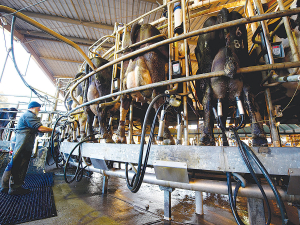Dedoncker Departs Fonterra After Mainland Group Sale
Fonterra executive René Dedoncker is leaving the co-operative later this year to lead Australian agribusiness Elders.
 The report claims that Fonterra's planned capital restructure would mean for the average dairy farm producing 176,000 kgMS per year - a loss of around $360,000 annually.
The report claims that Fonterra's planned capital restructure would mean for the average dairy farm producing 176,000 kgMS per year - a loss of around $360,000 annually.
Fonterra's planned capital restructure could see the co-operative's share price slump to $2/share - shaving $4 billion off the shareholders' balance sheet.
That's the claim of a report prepared for Fonterra rival Open Country Dairy. Consulting firm Castalia was hired by Open Country to look at the implications of Fonterra's recent capital restructure.
The report claims that for the average dairy farm producing 176,000 kgMS per year, this would mean a loss of around $360,000. The report was made public as Fonterra and the Government discuss final approval by Parliament.
Fonterra believes its new capital structure will attract more suppliers, ensure better utilisation of assets and help the co-op deliver a higher milk price to farmer shareholders.
Fonterra's competitors, including Open Country, could be forced to match the co-operative's milk price to retain shareholders. The NZ milk supply has peaked and competition for raw milk is intensifying.
Castalia says the restructure shifts wealth from farmers to Fonterra.
Fonterra has rejected the Castalia report.
In a statement to the NZ Stock Exchange, Fonterra director capital markets, Simon Till, says the co-operative disagrees with the report and a number of its conclusions - including the assertion that protections for a fair milk price will be eroded and that the restructure will cause Fonterra's milk price to increase.
"Fonterra also notes that Castalia estimates Fonterra's future share price on the basis of possible dividends up to 2030 but appears to assume that Fonterra has zero value at the end of 2030.
"Fonterra considers this to be a misleading approach to valuing its shares," Till says.
"The report contains no perspectives not previously considered by Fonterra and discussed with shareholders in the lead up to the 2021 vote."
Fonterra's share price has weakened since the capital structure was approved in December last year - down from $3.13 to $2.90 last week.
Jarden head of research Arie Dekker also questions the $2/share reference point used by Castalia. He notes that Fonterra is currently generating earnings per share of 30c and a 20c/share dividend.
Dekker says the co-operative hopes to increase earnings and dividends over the next ten years with meaningful investment to support that.
"Even in the absence of meaningful dividend growth, discounting divideds currently supported by earnings results in a share value well above the suggested $2," he says.
He also notes that Fonterra plans to return $1 billion capital to shareholders and that the proposed capital structure plans will not change the way in which the milk price is set.
"The level of independence in the setting of the milk price has long been an area of debate in the industry.
"The level of independent oversight was reviewed recently with a ministerial appointee added to the milk price panel," Dekker adds.
"Despite the questions, we remain of the view that the robustness of the milk price has been supported over the last two decades by the increase in independent processing capacity put in place in NZ."
Former Fonterra executive Alex Turnbull has been appointed CEO to lead all five Yili Oceania Business Division companies in New Zealand.
Fonterra executive René Dedoncker is leaving the co-operative later this year to lead Australian agribusiness Elders.
Alliance Group and the Southland Stags rugby team have joined forces in a partnership that will see the the meat co-operative's farmgate brand feature on players' team kits and replica jerseys.
Fonterra's plan to expand its organic programme to the South Island is being well received by farmers, the co-op says.
Voting has started for the renewal of DairyNZ's milksolids levy.
The most successful catchment groups in NZ are those that have 'a source to sea' approach.

OPINION: Here w go: the election date is set for November 7 and the politicians are out of the gate…
OPINION: ECan data was released a few days ago showing Canterbury farmers have made “giant strides on environmental performance”.